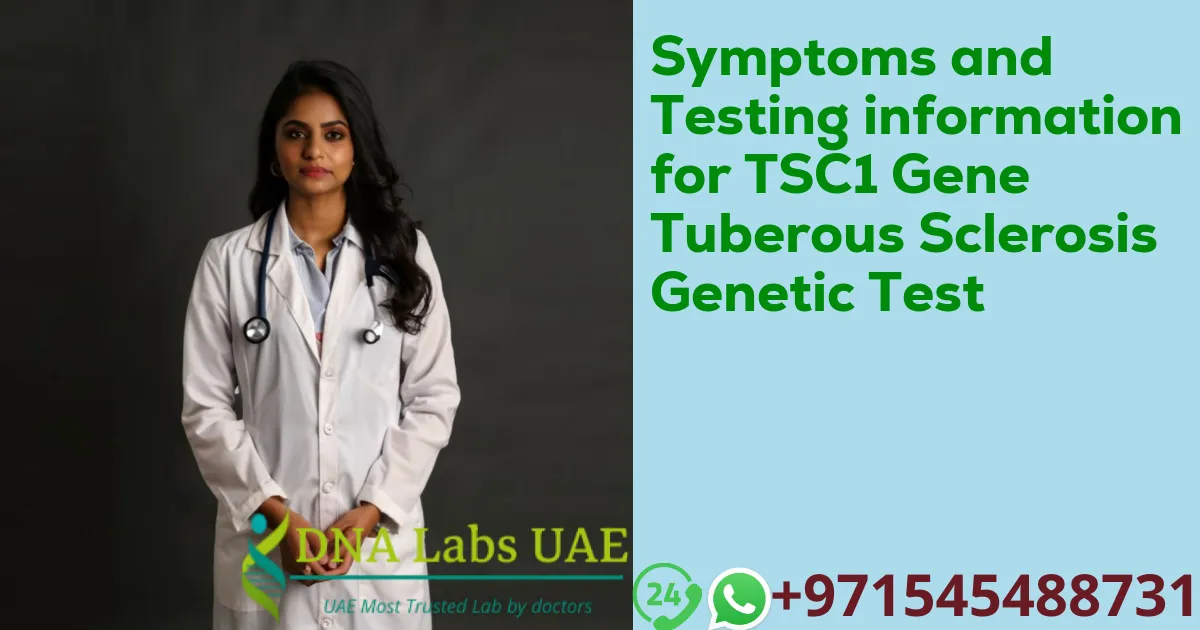Symptoms of TSC1 Gene Tuberous Sclerosis Genetic Test
Tuberous Sclerosis Complex (TSC) is a genetic disorder that affects multiple systems of the body, leading to the growth of benign tumors in organs such as the brain, kidneys, heart, lungs, and skin. It is caused by mutations in either the TSC1 or TSC2 genes. The TSC1 gene, located on chromosome 9, produces a protein called hamartin, which plays a critical role in controlling cell growth and size. Mutations in the TSC1 gene can disrupt this control, leading to the characteristic features of tuberous sclerosis. Recognizing the symptoms of TSC is crucial for early diagnosis and management of the condition.
One of the most comprehensive ways to confirm the diagnosis of TSC is through genetic testing. DNA Labs UAE offers a TSC1 Gene Tuberous Sclerosis Genetic Test, providing a definitive diagnosis by identifying mutations in the TSC1 gene. This test is pivotal for individuals displaying symptoms of TSC, as well as for family planning purposes for those with a history of TSC in their family.
Key Symptoms of TSC
The symptoms of Tuberous Sclerosis Complex can vary significantly from one individual to another, and they may change over time. However, some common symptoms associated with TSC1 mutations include:
- Cutaneous Manifestations: Skin abnormalities are common in TSC, including hypomelanotic macules (white patches), facial angiofibromas, shagreen patches, and ungual fibromas.
- Neurological Symptoms: TSC can affect the nervous system, leading to conditions such as epilepsy, developmental delays, intellectual disability, and autism spectrum disorder. Cortical tubers, which are benign brain tumors, are also a hallmark of TSC.
- Renal Symptoms: Benign tumors called angiomyolipomas often develop in the kidneys, and cysts may also be present, potentially leading to renal dysfunction.
- Cardiac Rhabdomyomas: These benign heart tumors are most often found in infants and can lead to arrhythmias or obstruction of blood flow.
- Pulmonary Lymphangioleiomyomatosis (LAM): This rare lung condition occurs primarily in women and can lead to lung failure. It is characterized by the proliferation of smooth muscle-like cells that can obstruct airways, vessels, and lymphatics.
- Retinal Manifestations: Retinal hamartomas are benign eye tumors that can cause vision problems.
It is important to note that the presence and severity of symptoms can vary widely among individuals with TSC. Some may live with mild symptoms, while others may experience significant health challenges.
Importance of Genetic Testing for TSC
Genetic testing for TSC, specifically the TSC1 Gene Tuberous Sclerosis Genetic Test offered by DNA Labs UAE for 4400 AED, plays a crucial role in the diagnosis and management of TSC. This test not only confirms the diagnosis but also helps in understanding the risk of transmitting the disorder to offspring. Furthermore, a precise genetic diagnosis can guide targeted treatment and management strategies, improving the quality of life for those affected by TSC.
Early diagnosis through genetic testing can lead to early intervention, which is critical in managing symptoms, preventing complications, and improving outcomes. Families with a history of TSC, or individuals showing symptoms, are encouraged to consider genetic testing as a step towards better management of the condition.
For more information about the TSC1 Gene Tuberous Sclerosis Genetic Test, including how to arrange for testing, please visit https://dnalabsuae.com/tests/tsc1-gene-tuberous-sclerosis-genetic-test/.
“`



